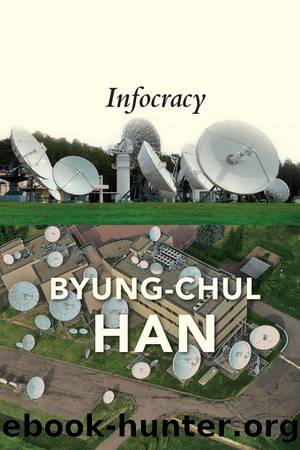Infocracy by Byung-Chul Han

Author:Byung-Chul Han [Han, Byung-Chul]
Language: eng
Format: epub
ISBN: 9781509552993
Publisher: Polity Press
Published: 2022-07-19T05:00:00+00:00
An intact lifeworld is possible only in a relatively homogeneous society, with shared values and a shared cultural tradition. Globalization, and the hyperculturalization of society to which it leads, dissolves the cultural and traditional contexts that ground us in a shared lifeworld.10 There are no longer any conventional identities with prereflexive validity. We are no longer thrown into a lifeworld that we take for granted and perceive as simply given. The lifeworld is now a project (eine Frage des Entwurfes). The holistic horizon that was once perceived as an inseparable unity is subjected to a radical process of fragmentation. In addition to globalization, digitalization and the creation of networks accelerate the disintegration of the lifeworld. The growing defacticization and decontextualization of the lifeworld destroy the âholistic backgroundâ of communicative action. The disappearance of facticity in the lifeworld is a serious impediment to communication aimed at reaching understanding.
The defacticization of the lifeworld leads to calls for the establishment of internet spaces that make the experience of identity and community possible again. The idea is to create an internet-based lifeworld that is experienced as taken for granted and simply given â in other words, to tribalize the internet. The tribalization of the internet is particularly widespread on the political right where there is a greater need for identities that are anchored in a lifeworld â liberal cosmopolitans seem to do without it. On the right, even conspiracy theories are taken up as markers of identity. Digital tribes allow for deep experiences of identity and belonging. In such tribes, information is not a source of knowledge but a source of identity.11 Conspiracy theories are particularly well suited to the creation of tribal biotopes on the internet because they allow for delimitation and exclusion, the mechanisms that constitute tribalism and its identity politics.
Tribal delimitation and isolation are not the result of an algorithmic personalization of the internet. They cannot be traced to the effects of filter bubbles. Digital tribes isolate themselves by independently selecting and using information for their identity politics. Contrary to the claims of the filter bubble theory, digital tribes are in fact confronted, inside their bubbles, with information that runs counter to their convictions. But this information is simply ignored, because it does not fit with the identity-creating narrative, and because to give up convictions would amount to a loss of identity that must be avoided at all costs. This is why tribal identity collectives reject any kind of discourse or dialogue. Reaching an understanding becomes impossible. The opinions the tribes express are not discursive but sacred: they fully coincide with their identities, which they will not give up under any circumstances.
Under conditions of communicative action, every participant makes a validity claim. If this claim is not accepted by the others, there will be a discourse. A discourse is a communicative act that attempts to reach an understanding in the face of differing validity claims. It takes place with the help of arguments that seek to justify or reject the validity claims.
Download
This site does not store any files on its server. We only index and link to content provided by other sites. Please contact the content providers to delete copyright contents if any and email us, we'll remove relevant links or contents immediately.
Reading Colonial Japan by Mason Michele;Lee Helen;(331)
Phoenicians among Others: Why Migrants Mattered in the Ancient Mediterranean by Denise Demetriou(297)
The Roman World 44 BC-AD 180 by Martin Goodman(273)
DS001-THE MAN OF BRONZE by J.R.A(268)
Banned in the U.S.A. : A Reference Guide to Book Censorship in Schools and Public Libraries by Herbert N. Foerstel(267)
The Dangerous Life and Ideas of Diogenes the Cynic by Jean-Manuel Roubineau(262)
Imperial Rome AD 193 - 284 by Ando Clifford(260)
Literary Mathematics by Michael Gavin;(236)
The Oxford History of World War II by Richard Overy(231)
Verus Israel: Study of the Relations Between Christians and Jews in the Roman Empire, AD 135-425 by Marcel Simon(229)
Introducing Christian Ethics by Samuel Wells and Ben Quash with Rebekah Eklund(228)
Infocracy by Byung-Chul Han(219)
Caesar Rules: The Emperor in the Changing Roman World (c. 50 BC â AD 565) by Olivier Hekster(214)
Give Me Liberty, Seventh Edition by Foner Eric & DuVal Kathleen & McGirr Lisa(199)
How to Reach the 9.0 in IELTS Academic Reading by IELTS Medical(196)
The Compleat Victory by Kevin J. Weddle(187)
The Oxford History of the Renaissance by Campbell Gordon;(183)
Language Hacking Mandarin by Benny Lewis & Dr. Licheng Gu(179)
The Manual of Photography by Elizabeth Allen & Sophie Triantaphillidou(179)
